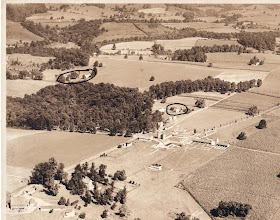 |
| The Springer-Chandler farms, 1927 |
the land in question was originally part of a tract that extended into MCH, and ultimately ended up as part of one which was featured in a post not long ago. It's a story that is, on the one hand, fairly simple. Over the course of more than 300 years, it was really only owned by members of four (although, really three) different families. But on the other hand, there are a few details and actions that make the chain of ownership a lot more complicated and confusing when viewed on a closer level. Also, there are actually several tracts in question, which multiple times are split up, only to be later reunited in ownership. Also also, I don't have a strong understanding of the exact boundaries of most of the tracts.
"Originally", the land in question (which is along Lancaster Pike between Centerville Road and Red Clay Creek) seems to have been on the eastern end of the holdings of the Barker family, who began acquiring much of the area around what would become Wooddale from the Penns as early as the 1680's. There were several members of several generations of Barkers who bought a number of tracts over the years, from Wooddale up to Mt. Cuba. For our purposes here, suffice it to say that in 1764, several grandchildren of Samuel Barker (who had purchased the land in 1685 from William Penn) sold a 200 acre tract in western Christiana Hundred to Charles Springer, son of Jacob Springer. While the exact boundaries are unclear to me (lots of white oaks and hickories and other property lines I don't know), it seems to generally sit now between Lancaster Pike and Barley Mill Road, mostly (or entirely) west of Centerville Road.
Charles presumably settled on the land and lived there for almost 40 years. In his 1802 will, he divided his land between sons Reese (who got the westerly part) and Thomas (who got the rest). Apart from being severed from the other Barker holdings, this is the first of several instances of the property being split up, only to be later reunited. Thomas Springer died in 1824, and in his will gave most of his land to his son Charles, except for about 40 acres that he says he bought from Joseph Robinson in 1809. This portion went to son William Foulk Springer. I was frustrated at first because I could not find any record of that 1809 sale, but I think I finally have a theory as to what happened.